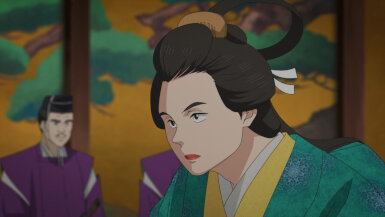 |
 |
 |
 |
 |
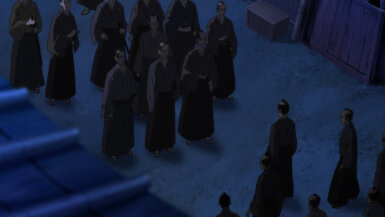 |
 |
 |
 |
 |
 |
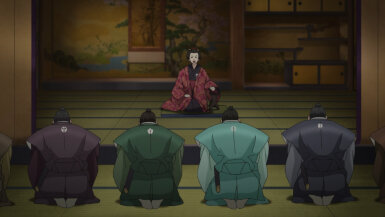 |
 |
 |
 |
 |
 |
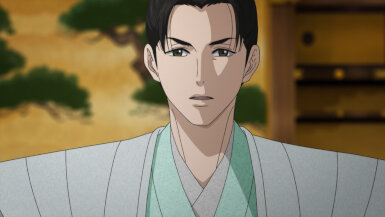 |
 |
 |
 |
 |
 |
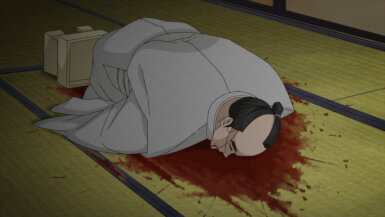 |
 |
 |
 |
 |
 |
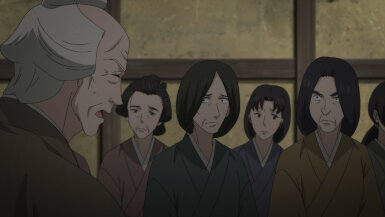 |
 |
 |
 |
 |
 |
 |
“Episode 10”
Japanese society as presented in this final episode is in a transition state in the process of evolving from the old creature it was into a new kind of beast. Yeah, that doesn’t feel too good, hearing the women in power treated as a worst-case scenario, last resort kind of provision. But, I guess it makes the point at how deeply entrenched in patriarchal habits society was/is. Honestly, even if/when the male population revived, do they really have to revert back to male-only positions of power? If it isn’t broken, why fix it, especially since the women are capable of getting shit done- one need only look at Kasuga and Iemitsu (though unfortunately, Kasuga crapped over everyone else’s life to do so). Then again, that’s probably still a hard pill to swallow for a traditional society just emerging from the old ways- change can be slow and hard.
It was good to see the women at the end make the point that they and not the men should be present at and voice their opinions at the village council meeting because they are the ones working the fields. Hear hear- the ones putting in the labor and who have the experience should be the ones to weigh in rather than electing people purely based on gender.
Trimming down the members of the Oooku is honestly a good idea, considering the huge expense it takes to maintain them. Even so, Iemitsu puts careful thought into the decision, letting go of those who are young and able enough to make a living outside of the Oooku. Or at least that’s what I thought, until it was revealed that she sent them to Yoshiwara. Going from the inner chambers into public prostitution is pretty much out of the frying pan and into the fire- I feel bad for how these men will end up. However, even if she had sent them straight home, they might have ended up in the same boat anyway with the penchant of mothers selling their sons’ bodies amongst the local girls. I get it, the shogun needs to boost the population but that way of doing it is rather unsavory- surely there must be another way?
Iemitsu’s girlhood trauma sticks with her (and something like that sadly never really goes away), inspiring the rule that the man to break the shogun’s maidenhead will have his head removed in turn. Rather cruel and unfair for the future swains if you ask me, but I guess it goes to show the sanctity of a woman’s body not to be taken lightly.
Another unfair rule- farmers not being allowed to eat rice (which was an actual historical rule). That is ridiculous, not permitting them to eat the food they grew themselves. This sets up clear class distinctions as well as emphasized the importance of rice in a society where taxes and land value was appraised in the amount of rice grown on it.
Luckily for Iemitsu, things start to look up as she publicly starts her reign (although it had started long before then), with a good year for crops and a boost in the male population, leading people to believe that a female shogun must be good luck.
Arikoto- how pitiful he has become in the end, with his statement that Iemitsu will always have others like her children to love, but not being able to provide children, he can never have that. What looked like calm compassion on the outside was actually a mask hiding the deep pain within. It makes me wonder- could there be any sort of good to the love or lust between Iemitsu and Arikoto if it reduced him to such a state? I suppose it did some good for Chie, building up her confidence to the level where she can strongly rule as she did- but what’s in it for him?
What’s in it for him- power and prestige in the Oooku as the head of the chambers and caretaker for the next shogun. It was sweet to see him look after her like the daughter he never had.
An interesting remark was made at the end that the jobs of men and women weren’t swapped but rather, men’s functions were reduced only to baby making and women had to pick up all the slack. It’s essentially a female-run society, the women doing everything- a commentary that far from the gentle, fragile creatures that they were formerly treated as, women have the grit and determination to take on the burden of all of society’s roles- homemaker, mother, head of household, main breadwinner- they can do it all. Far from equality, it is inequality but in the far opposite direction, the men getting to laze around during the day and sell their bodies at night while the women do all the work. Furthermore, the men are just as favored as before but this time for their sperm rather than for being head of the household. Rather a dark point to make that even in the wake of a population-culling disease, everything changes yet nothing changes.
Another fascinating commentary was the emphasis placed on usefulness and once that function is outlived, so does the person’s purpose. To that end, the elderly men are abandoned in the forest to die, making room at the table for food for useful mouths. There are folktales of such things happening to elderly people and for a while, it was speculated that perhaps abandonment of elders did in fact happen in real life. However, intriguingly, some scholarly research that was conducted in measuring historical populations and examining other historical evidence found that such treatment (or rather lack thereof) of elders was most likely non existent (if interested in further information, see Recreating Japanese Women, 1600 – 1945).
Well, and thusly ends Netflix’s adaptation of Oooku. All in all a fair adaptation of the manga. It wasn’t dazzlingly brilliant but nor did it fall short. They got the intricacies and darkness of the plot down and where they started and left off made sense given how little of the source material they ended up putting on screen. I wonder if they’ll ever adapt more of it- who knows? At least I can say I’m glad it was made and I hope it sparks enough interest in anime-only viewers to check out the manga source- if you haven’t already, I’d highly recommend it!
